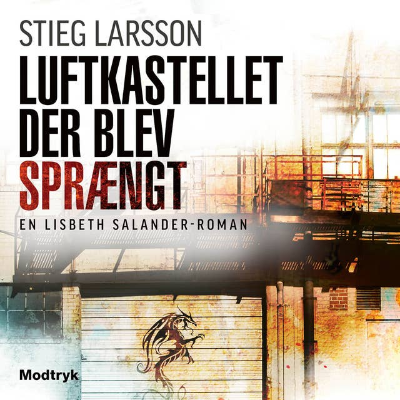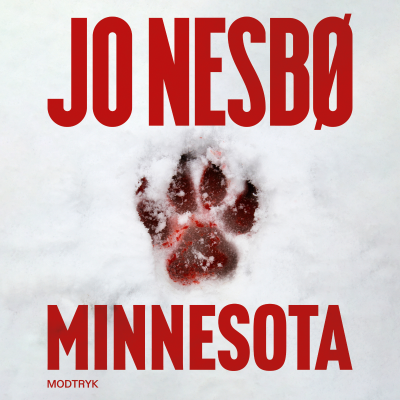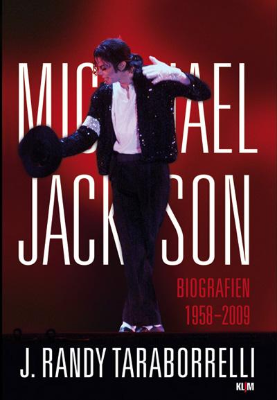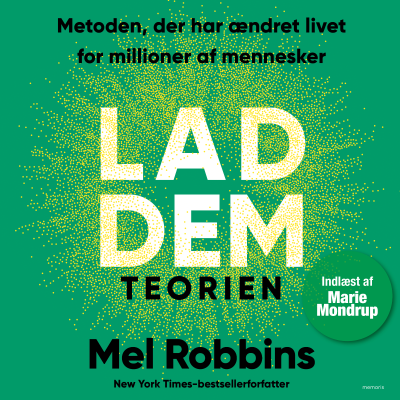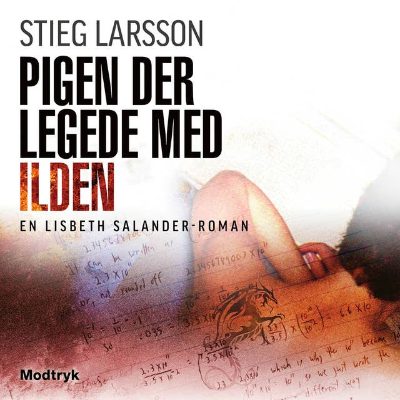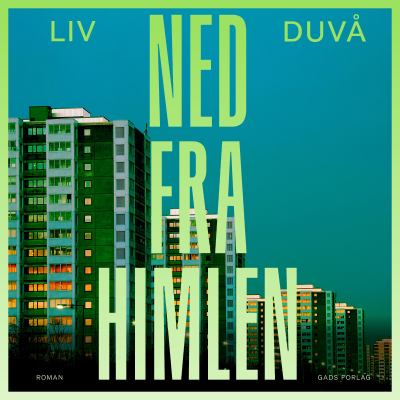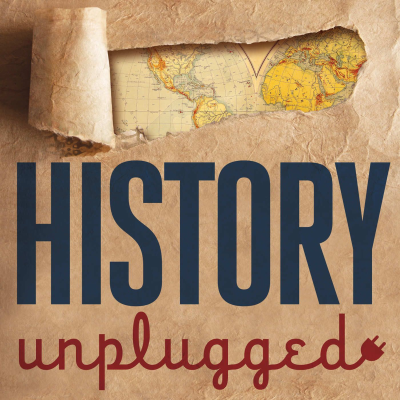
History Unplugged Podcast
engelsk
Historie & religion
Begrænset tilbud
1 måned kun 9 kr.
Derefter 99 kr. / månedOpsig når som helst.
- 20 lydbogstimer pr. måned
- Podcasts kun på Podimo
- Gratis podcasts
Læs mere History Unplugged Podcast
For history lovers who listen to podcasts, History Unplugged is the most comprehensive show of its kind. It's the only show that dedicates episodes to both interviewing experts and answering questions from its audience. First, it features a call-in show where you can ask our resident historian (Scott Rank, PhD) absolutely anything (What was it like to be a Turkish sultan with four wives and twelve concubines? If you were sent back in time, how would you kill Hitler?). Second, it features long-form interviews with best-selling authors who have written about everything. Topics include gruff World War II generals who flew with airmen on bombing raids, a war horse who gained the rank of sergeant, and presidents who gave their best speeches while drunk.
Alle episoder
1054 episoderThe American Revolution was a World War in All but Name
The Battles of Lexington and Concord in April 1775, known as the "shot heard round the world," marked the first military engagements of the American Revolution. Ralph Waldo Emerson named it that because it launched revolutionary movements in Europe and beyond, marking it as a key moment in the fight for liberty and self-governance. But this moment was global in more ways than inspiring other nations. The quest for independence by the 13 North American colonies against British rule rapidly escalated into a worldwide conflict. The Patriots forged alliances with Britain’s key adversaries—France, Spain, and the Netherlands—securing covert arms supplies initially, which evolved into open warfare by 1779. French and Spanish naval campaigns in the Caribbean diverted British forces from North America to defend valuable sugar colonies, while American privateers disrupted British trade, bolstering the rebel economy. All of this international involvement was promoted by the Founding Fathers, because the Declaration of Independence was translated into French, Spanish, Dutch, and other languages and distributed by them across Europe to garner sympathy and support from nations like France and the Netherlands. Spain’s separate war against Britain in Florida and South America, alongside French efforts to spark uprisings in British-controlled India, further strained Britain’s ability to quash the rebellion. Post-independence, the consequences rippled globally: Britain and Spain tightened their grip on remaining colonies, Native American tribes faced heightened land encroachments due to the loss of British protections, and enslaved African Americans who fought for Britain, lured by promises of freedom, were relocated to Nova Scotia and later Sierra Leone. To explore this new framework of the Revolutionary War is today’s guest, Richard Bell, author of “The American Revolution and the Fate of the World.” See omnystudio.com/listener [https://omnystudio.com/listener] for privacy information.
How Napoleon and Churchill Used Neuroscience to Make a Better Soldier and More Loyal Public
The brain acts in strange ways during wartime. Even in active combat situations, when soldiers are one mistake away from death, many can’t fire on their enemies because their brain is triggering compassion centers against other soldiers. Studies of World War II show that while soldiers were willing to risk death, only 15% to 20% fired their weapons in intense combat, indicating a reluctance to kill. That’s why successful military leaders were able to motivate their soldiers with ideas of unfairness and justice, that their enemies weren’t human to make them better at fighting and killing. All this goes to show that if you want to understand war, you have to understand how the brain makes sense of it. Does war make all of us retreat to our lizard brain and act on pure instinct – so the only way to win is pumping out manipulative propaganda to the masses and use modern technologies like AI and social media exploit the brain's cognitive vulnerabilities? Well, many nations like Russia and China are already using these to their advantage. Or can we bring higher thinking to the matter? Is a researcher like Robert Sapolsky right when he argues that we can stop wars by persuading enough people that it is bad and pointless. Today’s guest is Nicholas Wright, author of “Warhead: How the Brain Shapes War and War Shapes the Brain.” He’s a neuroscientist and advisor to the Pentagon. We explore how our brains respond under pressure and how these instincts can shape everything from battlefield outcomes to boardroom decisions. He argues that while conflict is inevitable, it’s not unmanageable - if we understand how the brain drives fear, trust, aggression, and judgment. See omnystudio.com/listener [https://omnystudio.com/listener] for privacy information.
William F. Buckley JR.'s Guide to Friendship in a Polarized Era
William F. Buckley Jr., the charismatic intellectual who defined modern American conservatism, was famously skilled at forging friendships across the ideological divide, a talent that helped him both shape the political landscape and navigate public opinion. His capacity for personal charm allowed him to be a public extremist and a private moderate, keeping him in the good graces of the liberal elite, including figures like Senator George McGovern and activist Allard Lowenstein, even as he worked to advance his conservative agenda; however, this magnanimity had its limits, most famously with his true enemy, Gore Vidal. Today's guest is Josh Cohen, author of William F. Buckley Jr.'s Guide to Friendship in a Polarized Era, and we explore how this patrician gatekeeper of the right strategically used ideological "frenemies" and acquaintances, such as the surprising connection with Hugh Hefner, to legitimize his movement and advance his influence, culminating in the infamous, televised confrontation with Gore Vidal that exposed how even Buckley's renowned decorum shattered when his core beliefs were challenged. See omnystudio.com/listener [https://omnystudio.com/listener] for privacy information.
What it Was Like Living Through the USSR’s Collapse
The Collapse of the Soviet Union was twice as devastating as the Great Depression for those who lived there. It immediately led to widespread economic chaos and a breakdown of public services, plunging millions into a difficult period where mere survival was the priority. As one Russian described, after hyperinflation wiped out their family's savings, "my parents still had the same 50,000 rubles... But by then, all they could afford to buy with it was a pair of winter boots for my mother." There was optimism that democracy could emerge, but thirty years after the collapse of the USSR, the victory over totalitarianism feels alarmingly short-lived, with the unresolved unraveling of the Soviet empire now directly fueling global crises like the war in Ukraine. The people currently in power in Russia, belonging to what some call the last Soviet generation--meaning they absorbed Soviet culture but not Soviet faith--carry a deep, cynical disbelief in democracy and human rights, demonstrating how the core structures of empire remain entrenched in the governing forces today. Today's guest is Mikhail Zygar, author of The Dark Side of the Earth: Russia's Short-Lived Victory Over Totalitarianism, and we explore his decade-long investigation, drawing on hundreds of never-before-public interviews with figures like Mikhail Gorbachev, the first leaders of post-Soviet republics, and democracy activists, to reveal how the USSR's demise was primarily driven by a collapse of faith in communist ideals, and we examine the parallel it creates for liberal democracy today. See omnystudio.com/listener [https://omnystudio.com/listener] for privacy information.
The Battle of Agincourt, 1415: Longbowmen, Bands of Brothers, and Henry V’s Triumph
From Shakespeare's 'band of brothers' speech to its appearances in numerous films, Agincourt rightfully has a place among a handful of conflicts whose names are immediately recognized around the world. The Battle of Agincourt, fought in 1415, is famous for the decisive role of the English and Welsh longbowmen, who—despite being significantly outnumbered and exhausted—decimated the heavily armored French nobility with volleys of arrows. This unlikely victory was profoundly important because it not only paved the way for King Henry V to be named heir to the French throne via the Treaty of Troyes, but it also demonstrated the waning dominance of the medieval knight in warfare. Today’s guest is Michael Livingston, author of “Agincourt: Battle of the Scarred King.” We go back to the original sources, including the French battle plan that still survives today, to give a new interpretation, one that challenges the traditional site of the battlefield itself. The English victory at Agincourt on October 25, 1415, was a result of strategic brilliance, terrain advantage, and the devastating effectiveness of the longbow, combined with French tactical errors. Henry V’s smaller army, roughly 6,000-9,000 men (mostly longbowmen), faced a French force of 12,000-36,000, including heavily armored knights. See omnystudio.com/listener [https://omnystudio.com/listener] for privacy information.
Vælg dit abonnement
Begrænset tilbud
Premium
20 timers lydbøger
Podcasts kun på Podimo
Gratis podcasts
Opsig når som helst
1 måned kun 9 kr.
Derefter 99 kr. / måned
Premium Plus
100 timers lydbøger
Podcasts kun på Podimo
Gratis podcasts
Opsig når som helst
Prøv gratis i 7 dage
Derefter 129 kr. / month
1 måned kun 9 kr. Derefter 99 kr. / måned. Opsig når som helst.

















